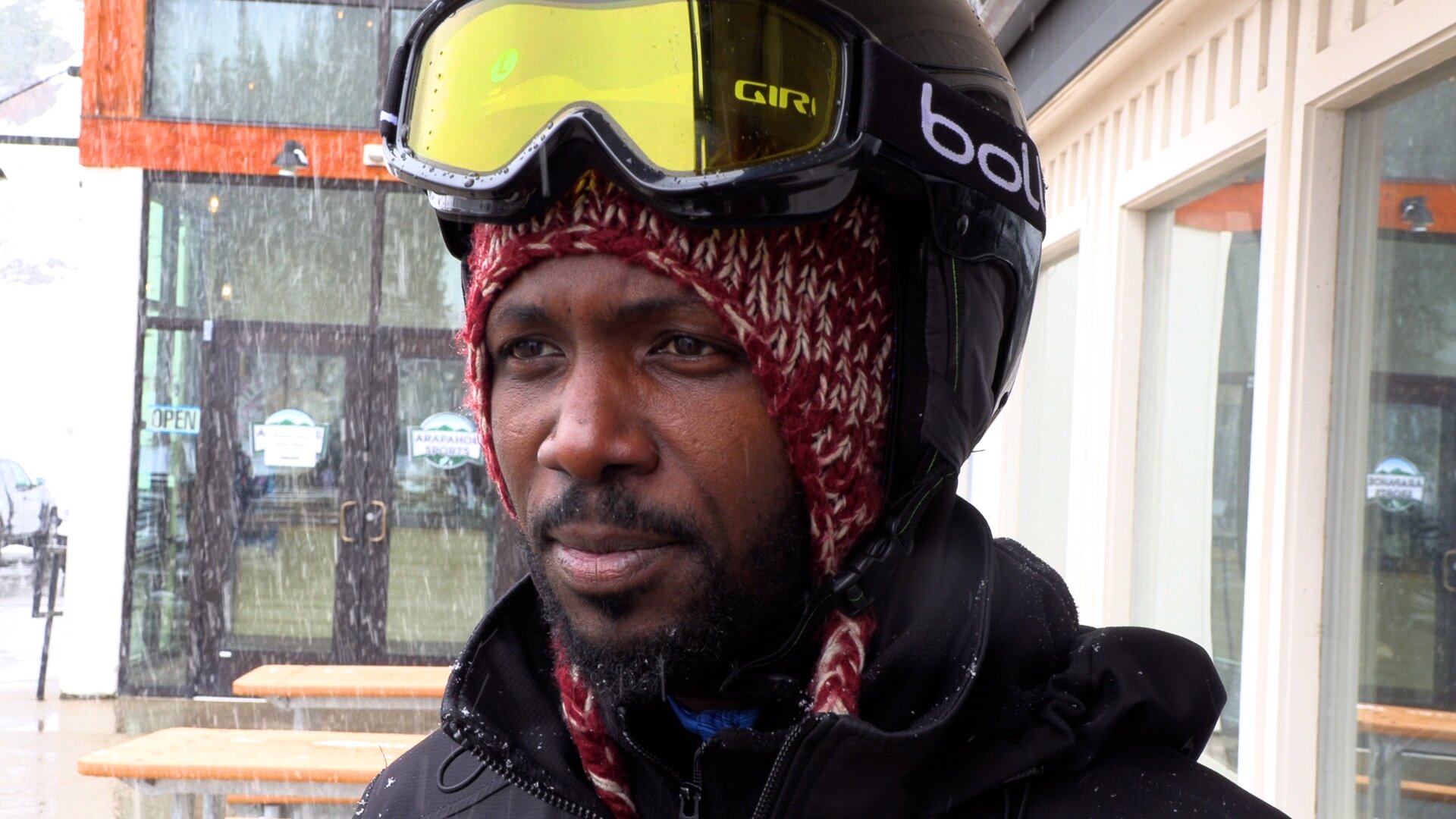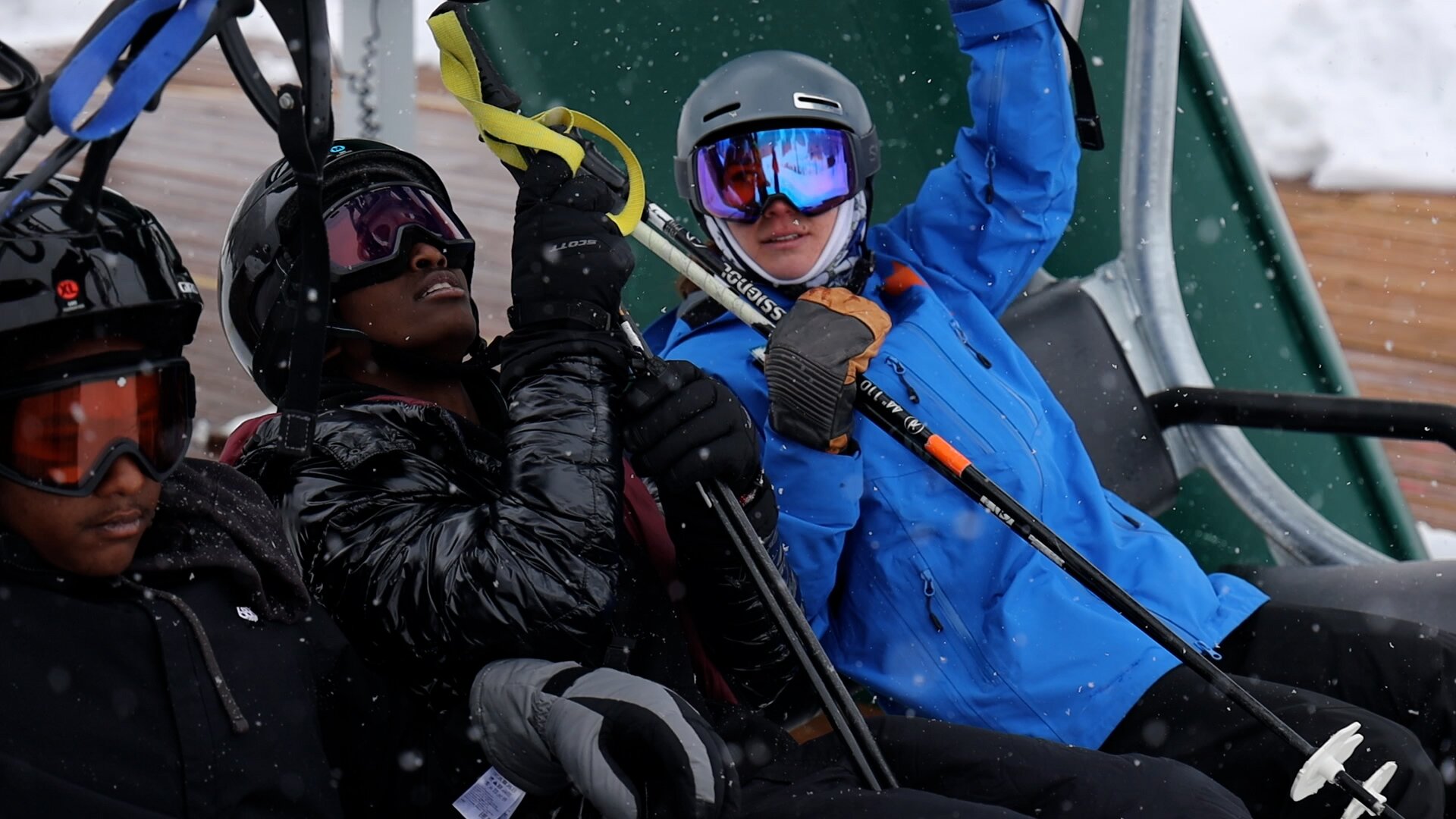Newcomers Ski Group brings Black immigrants to Colorado’s slopes

DILLON, Colo. — For Lamine Kane, acclimating to Colorado’s weather wasn’t nearly as hard as adjusting to life in Silverthorne as an immigrant from Senegal.
After moving to Colorado in the late 90s, Kane said, his family were stared at just because they “looked different.” He watched his peers be active in winter sports but, “I wasn’t encouraged to [ski],” he said.
But life offered a second chance. Just this year, Kane, 36, joined Newcomers Ski Group, a Denver-based organization that brings first- and second-generation African immigrants on free skiing and snowboarding trips at Arapahoe Basin.
Kane said he and 16 other group members received looks and stares as they gathered at the base of the ski lift to experience the mountain for the first time.
“People are just not used to seeing this many Black people at once all together in places like this,” said Kane.
Kane moved with his family from Africa to Philadelphia when he was 12 to reunite with his father. Kane said his father moved to the U.S. to escape violence in Congo and to find a higher-paying job to provide for the family.
Later, the family moved to Silverthorne, where Kane said he felt a culture shock among a majority of white peers.
“First, I am a Black person, I’m an African, and I am an immigrant. I already have these three differences that make me different from everybody [in Silverthorne],” said Kane. “I was one of the three or four Black kids in my school. It was a rough experience not knowing how to be part of that community and not feeling welcomed by my peers.”
He had been reluctant to try snow sports, he said, because no one in his family participated in the sports. In Silverthorne, he didn’t see or hear much about Black people skiing or snowboarding.

Lamine Kane, who is from Senegal, said he felt culture shock moving from Philadelphia to Silverthorne as a child.
Photo: Lindsey Ford, Rocky Mountain PBS
He also dismissed getting into snow sports because of the cost.
“Just buying [winter-resistant] pants and jackets are expensive,” he said.
The average cost for a day-long ski pass in the U.S. is between $50 - $250, and that doesn’t include travel costs, food and drink, or renting gear, which can add up to more than $1,000 for one day on the slopes, according to Outdoormaster.
Colorado’s ski industry generates $4.8 billion for the state every year, according to data from Colorado Ski Country USA and Vail Resorts, and 89% of skiers identify as white. But for people of color and immigrants like Kane, participating in that part of Colorado culture can feel unwelcoming.
That’s why Ethiopian immigrant Mohamed Kadir, 38, started the Newcomers Ski Group in 2021. Since then, Newcomers has taken Black immigrants to ski at Loveland and Arapahoe Basin once a year.
Kadir moved to the U.S. in 2004 and lived in snowy states including Minnesota, Wisconsin, and Illinois before moving to Colorado. He first started skiing in his 30s when he lived in Wisconsin.
Once in Colorado, Kadir met friends of African descent who skied and they inspired him to start the Newcomers Group. He said he and his friends understood how intimidating skiing and visiting rural mountain towns can be for immigrants like themselves.
“I think winter sports are fun, and people like to have fun,” Kadir said. “It is just a matter of first getting [to the mountains] and being aware places like Arapahoe Basin exist.”
Kadir funded Newcomers with grants from the Oromo Community of Colorado, The Denver Foundation and Grand Design, Inc. Kadir’s efforts cover the cost of food, gear, lift tickets, and transportation for participants.
“The reason why this is such a good experience is because it is something different,” Kadir said of getting outside in the snow.
“When you do something different, your mind opens up, your opportunities open up, and you generally expand. It's a good thing,” he said.
Around the U.S., Black and African-American skiers make up 1.5% of skiers, according to the National Ski Areas Association.
In 1972, Ben Finley and Art Clay, two Black ski enthusiasts, founded the National Black Summit to increase that percentage and bring more Black skiers to the slopes. The group now meets annually at a different ski resort across the U.S.
“It's only when we are able to see people that look like us doing these sports that we get somewhere,” Finley said. “When people see representation, they may think in the back of their minds, ‘Maybe I’d like to try that.’”
Over time, Kane said he eventually settled into Silverthorne and became a local. He made friends with kids in his town and was invited to participate in winter activities, including snowboarding.

While he said he doesn’t speak for everyone, Kane said three main factors tend to keep people of color away from winter sports: accessibility, representation, and financial barriers.
To start Kane off as a snowboarder, his friends offered to let him borrow their gear, like goggles, snowboarding pants, gloves, and a jacket.
“[And my friends] said, ‘Hey, we can hook you up with a pass,’” he said.
Kane said he is an “exception” to many immigrants because he experienced snowboarding with the help of his Silverthorne friends.
Firdosa Mohamed, 23, who moved from Ethiopia to Colorado at 10, learned about Newcomers Ski Group from a flier. She said she always wanted to try skiing, but never went alone because it looked dangerous.
“I pushed myself to do it because it is learning something new and gaining a new skill,” said Mohamed of her day at Arapahoe Basin.
Mohamed said the weather in Ethiopia is warm and rainy, so when she video calls her family back home during winter, they’re shocked to see all the snow.
“[My family is] like, what is this? White all over the ground!” she said.
Playing in the mountains is part of Colorado culture and is happy to be a part of it, Mohamed said.
“At the end of the day, it's all about learning, so I’m glad we’re out here doing it,” she said.
Lindsey Ford is a multimedia journalist at Rocky Mountain PBS. Lindseyford@rmpbs.org